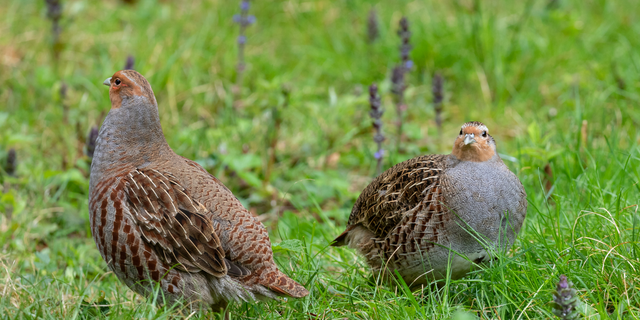08
Sep
Ingestion of Real-World Pesticide Residues in Grain Threatens Bird Offspring More than Parents

(Beyond Pesticides, September 8, 2022) A study published in Environmental Pollution finds parental exposure to real-world, sublethal concentrations of pesticide residues on grains is a major contributor to unfavorable offspring development among foraging birds. Parents’ ingestion of grains with conventional pesticide residues, whether from contaminated or pesticide-treated seeds, results in chronic exposure that adversely affects offspring health, even at low doses.
The adverse effects pesticides and other environmental pollutants have on birds are amply documented and researched. Although many studies evaluate acute or chronic health implications associated with pesticide exposure in a single generation, there is a lack of information on multi-generational impacts that can provide vital information on the fundamental survivability or fitness of bird species. Considering this study emphasizes parental exposure to environmental pollutants can have adverse consequences for future generations, it is necessary that future risk assessments for birds address these implications when implementing agricultural pesticide policies. The study notes, “[S]ublethal effects of such compounds [pesticides] on non-target species should be included in the regulation. Moreover, as agroecosystem pollution is not resulting only from pesticides, there is an urgent need to analyze cocktail effects, not only between molecules of pesticides but also between pesticides and other pollutants such as heavy metals.”
The study considers the impact that mixtures of different pesticide residues at environmentally relevant levels have on foraging birds, specifically the grey partridge. Researchers fed 24 breeding pairs of birds grain from conventional agriculture containing pesticide residues and organic grains without pesticide residues as a control. The diet of grains mimics that of food availability encountered by wild birds in the environment. The researchers assess how the consumption of grain with pesticide residue impacts offspring growth and health through parental effects upon reproduction. The results demonstrate that grains with pesticide residues in this study do not affect the parental birds’ condition (body mass index, red blood cell count, energy conversion) or egg-laying abilities. However, researchers find that ingestion of low pesticide residues in grain has consequences on reproduction and offspring quality without altering mortality. Chicks whose parents consume grains with pesticide residues are more petite in size, lack proper skeletal growth, and have lower red blood cell counts with increasing body mass index as a trade-off.
Inheritance of genetic dysfunction relating to hereditary influence on gene expression is a familiar phenomenon. Various studies note that adverse genomic alterations can phase down to future generations. As far back as 15 years ago, a Washington State University study linked pesticide exposure to multi-generational impacts on male fertility in rodents. More recently, researchers found that glyphosate (patented as an antibiotic) has adverse multi-generational effects, causing negligible observable impacts on pregnant rodents, but severe effects on the two subsequent generations, including reproductive (prostate and ovarian) and kidney diseases, obesity, and birth anomalies. New findings suggest exposure to the pesticide atrazine causes multi-generation resistance to the chemical in wasps by altering gut bacteria composition. Even banned pesticides like DDT still impact current and future generations, as the chemical (and subsequent metabolites) can cause multi-generational cancer, multi-generational obesity, and generational reproductive abnormalities via endocrine disruption. Moreover, chemical byproducts made during the pesticide manufacturing process, such as dioxin, have multi-generational consequences on reproductive health.
This study is one of the few to evaluate current levels of multiple pesticide residues in the ecosystem and their potential impact on birds in the wild. However, plenty of research demonstrates the toxicity pesticides pose to bird populations. As far back as 2013, the American Bird Conservancy published a report finding that just a single kernel of neonicotinoid (neonic)-coated corn is toxic enough to kill a songbird, highlighting the acute toxicity of pesticides on bird declines. A 2017 study found that neonicotinoids can disrupt songbird migration, making it more likely that a bird will die during its perilous migration route. As confirmed by a 2019 study, pesticides like neonics usually are not killing migratory birds outright. Instead, exposure to these pesticides precipitates a cascade of sublethal impacts that reduces songbird fitness in the wild, making them more likely to die or be killed. Thus, this study reflects similar consequences among many foraging bird species, cautioning, “The consequences of parental exposure on chicks might partly explain the decline in wild Grey partridge populations, which raises questions for avian conservation and demography if current ARGOSystems approaches are continued.”
Beyond Pesticides believes that we must eliminate pesticide use to mitigate the multi-generational impacts these chemicals pose on human and animal health. Identifying pesticide residues on grain as a source of pesticide exposure is relevant when assessing the future risks pesticides expound unto bird species. In addition to toxicity exposure, improper control regulations, poor manufacturing, and high application variability make pesticide residues problematic. The data from this study has implications for many bird species exposed to toxic chemicals at environmentally relevant levels. Therefore, future policy decisions on related pesticides should advocate for formidable safeguards on the agrochemical industry that ensure the ecosystem is safe from chemical hazards. In doing so, we can shift away from unnecessary reliance on pesticide. Adopting regenerative-organic practices and using least-toxic pest control can reduce harmful exposure to pesticides. Switch to organic to reduce wild birds’ exposure to toxic pesticide residues and replace pesticide-treated seeds with organic seeds from Beyond Pesticides’ organic seed directory. Learn more about pesticide-treated seeds and their harm by viewing Seeds that Poison. To see how you can protect your local bird population, learn more about pesticides’ impact on birds and how an organic diet can help eliminate pesticide exposure.
All unattributed positions and opinions in this piece are those of Beyond Pesticides.
Source: Environmental Pollution











My heart hopes that the right thing is done for our environment so that ALL living can live their life.❤️
September 15th, 2022 at 12:27 pm